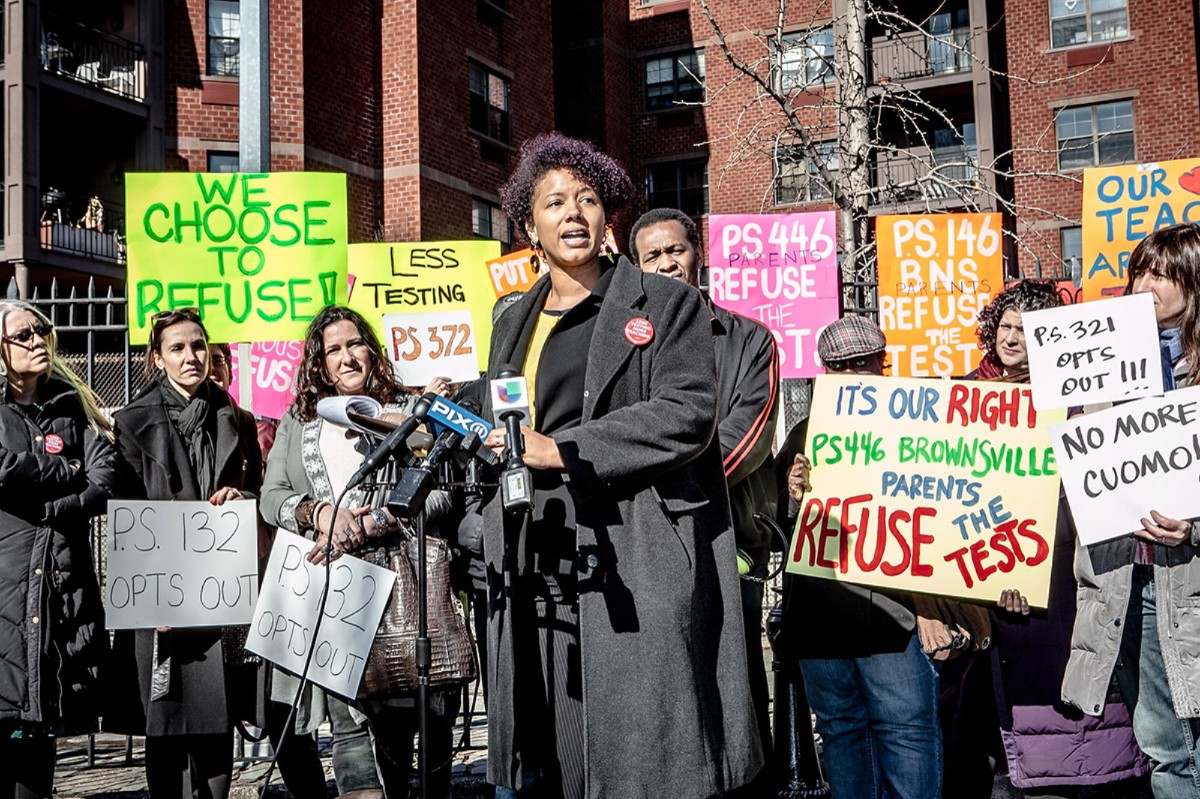In February, the Biden administration told states they must resume their annual standardized testing of K-12 students this spring after a year-long hiatus prompted the COVID-19 pandemic.
In a direct nose-thumbing at federal and state guidelines, the New York City Department of Education recently announced that parents will have to opt in if they want their kids to take standardized assessments.
It’s a confusing landscape, but one takeaway, suggests Teachers College’s Oren Pizmony-Levy, Associate Professor of International & Comparative Education, is that there’s a powerful new impetus for Opt Out, the grassroots movement that came to prominence in 2015, when hundreds of thousands of parents concerned about over-testing, teaching to the test, and a lack of transparency began refusing to allow their children to take states’ standardized tests.

TEAMING UP ON OPT OUT Oren Pizmony-Levy, Associate Professor of International & Comparative Education, has teamed up with alumna and adjunct TC faculty member Nancy Green Saraisky on studies of the Opt Out movement. (Photo: TC Archives)
“You’d think the pandemic would have weakened the movement because people have had other things on their mind, but with recent developments, the opposite may turn out to be true,” says Pizmony-Levy, who says he is interested in the Opt Out movement because “the U.S. presents an interesting case of resistance to the global education reform movement [GERM] that is reflected in standardized tests and other products of the broader neoliberal agenda in education.”
Research by Pizmony-Levy and TC alumna Nancy Green-Saraisky (Ph.D. ’15), Adjunct Assistant Professor in the Department of International & Transcultural Studies, has created a complex portrait of Opt Out in recent years.
In 2016, in a survey titled “Who Opts Out and Why? Results from a national survey on opting out of standardized tests,” the pair reported that “the typical Opt Out activist is a highly educated, White, married, politically liberal parent whose children attend public school and whose household median income is well above the national average.”
Yet within that composite portrait, there was, in fact, rich variation. Pizmony-Levy and Green Saraisky wrote that the movement “brings together Democrats (46.1 percent), Republicans (15.1 percent), Independents (33.3 percent), and supporters of other parties (5.5 percent).” This diverse constituency shared “more than just opposition to high‐stakes testing”: Respondents’ reasons for participating in Opt Out included the belief that judging teacher performance by students’ standardized test scores is unfair; that testing is narrowing school curricula; and that testing reflects the corporatization/privatization of education. Many also said they were opposed to the implementation of the Common Core State Standards.
Watch a webinar on Opt Out, led by TC's Oren Pizmony-Levy, featuring activists in the national movement.
In 2020, Pizmony-Levy and Green Saraisky broadened their portrait of Opt Out to account for how more organized activist forces have contributed to it. In “From Policy Networks to Policy Preferences: Organizational Networks in the Opt-Out Movement,” they noted that while organizational networks shape education policy by influencing power holders and elites, they can have similar effects on grassroots activists. Working from data from past surveys on opting out, they wrote:
“Despite characterizations of the Opt-Out movement as a bunch of soccer moms disappointed with their children’s tests scores, our findings show that opt-out is in fact a structured movement reliant on social movement organizations (SMOs) with agendas that go beyond standardized tests.” Further, the study found that “organizational networks may inform education policy by creating a social space for activists to learn about different policy ideas in education.”
[Click here to participate in a new study by Pizmony-Levy and Green Saraisky about Opt Out.]
Despite characterizations of the Opt-Out movement as a bunch of soccer moms disappointed with their children’s tests scores, our findings show that opt-out is in fact a structured movement reliant on social movement organizations.
—Oren Pizmony-Levy, Associate Professor of International & Comparative Education, and Nancy Green Saraisky, Adjunct Assistant Professor
While the full impact of Opt Out remains unknown, it’s clear that Americans are aware of the movement. Still, in the 2017 study “How Americans View the Opt Out movement,” Pizmony-Levy and TC alumnus Benjamin Cosman, found that Americans’ perceptions of Opt Out participants and their motivations did not track with what participants said about themselves.
For example, when asked about the main two reasons parents take part in the movement, more than two‐fifths of respondents said parents oppose the Common Core State Standards and believe standardized tests force teachers to teach to the test. More than a quarter of respondents suggested that parents take part in the movement because their children do not do well on standardized tests.
When the special issue of The TC Record edited by Pizmony-Levy, Lingard, and Hursh is published this May, it will take analysis of the Opt Out movement still further in the direction of exploring organized activism.
The special issue includes 11 original articles reporting on the status of the Opt Out movement in different areas of the United States, and offers additional commentary by Jamaal Bowman, U.S. Representative for New York’s 16th Congressional District and colleagues about the role of principals in the Opt Out movement. While the different contributions amount to a ground-level view of a movement in progress, they also frame the movement as being a response to New Public Management (NPM) — a term that encompasses privatization, school choice, competition, and technology-driven accountability as strategies to address educational problems.
“At its core, NPM reflects the changing nature of governance in which policies are often made not through a democratic process in which citizens can influence their representatives, but by a variety of powerful actors, including edu-businesses,” the Pizmony-Levy and his co-guest editors write in their introduction to the special issue. They go onto locate NPM in the still broader context of GERM which, they note, has been cast by some as “the globalization of an Anglo-American mode of educational accountability. GERM includes the creation of school markets and competition between schools, the introduction of private-sector management practices in schools and systems, and the introduction of new modes of educational governance linked to the restructured state.”
A webinar held this past winter by Pizmony-Levy, attended by more than 400 participants and since watched by more than 1,000 viewers, suggests that Opt Out is indeed alive, well and gaining new energy from recent developments.
Standardized testing “is racist” and “comes from eugenics,” with an explicit agenda to “prove racial inferiority,” said webinar speaker Denisha Jones, Director of the Art of Teaching Graduate Teaching Program at Sarah Lawrence College and an administrator of United Opt Out National. “It’s a way to set up children and their families for failure. No is talking about learning loss for the kids who get a private pod teacher with their close friends. It’s just the Black and the Brown and the poor white kids who are going to be called a generation of learning loss and that are going to get scripted curriculums and more testing to prove what we already know — that they were born into poverty and poverty continues to determine the type of education they get in this country.”
Ricardo Rosa, Associate Professor of Educational Leadership at the University of Massachusetts-Dartmouth and a teacher in the New Bedford, Massachusetts school system, spoke about the damage testing inflicts on education itself, charging that “students are isolated in the sense that they are socialized into believing that testing and test prep are the norm in education. Skill and drill and lower order thinking is what they know,” he said, adding “it’s sometimes the case that when creative teachers try to move deeper into the life of the mind, students are uncomfortable and may refuse to engage.”
And Robert Schaeffer, Interim Director of Fair Test and former Research Director of the Massachusetts Legislature's Joint Committee on Human Services and Elderly Affairs, said that standardized tests administered now will fail to deliver the information they’re supposed to provide.
There is no such thing as standardized education in the last two years. The notion that you can get any measure from kids whose learning and life experiences have been so totally different is insane. The test will fail to meet the basic standards of any assessment. It won’t be reliable, valid or educationally useful.
—Robert Schaeffer, Interim Director of Fair Test
“There is no such thing as standardized education in the last two years,” Schaeffer said. Some children have worked from home, some have been taught through a hybrid of in-person and remote teaching, and others “have not connected at all” with their schools during that period. “The notion that you can get any measure from kids whose learning and life experiences have been so totally different is insane. The test will fail to meet the basic standards of any assessment. It won’t be reliable, valid or educationally useful.”
